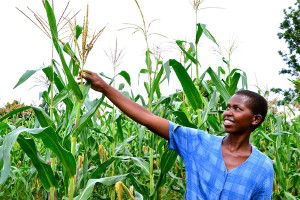By Timothy Mburu, CCAFS
A recent gender-focused study conducted in baseline sites in East Africa reveals some interesting results related to how men and women farmers access climate-information and are adopting climate-smart practices and strategies.
Joash Mango, a researcher with the CGIAR Research Program on Climate Change, Agriculture and Food Security (CCAFS) and Edith Ampaire, researcher with the International Centre for Tropical Agriculture (CIAT) recently presented initial findings from their recently conducted gender-focused household survey.

Their presentation “Understanding Gender and Climate Change” attracted a number of participants as it was held during a well-organized Gender Workshop at the World Agroforestry Centre (ICRAF) in mid-May. The workshop, organized by CCAFS and International Food Policy Research Institute (IFPRI) had the am
bition to present the latest research and findings out there on gender, climate change and agriculture.
The farm based studies were conducted in three of our baseline CCAFS sites, mainly in Nyando and Wote in Kenya, and Rakai in Uganda. In each site, an intra-household survey was conducted whereby men and women were interviewed separately. In total 200 households were visited.
The study, which will be released later this year, revealed that more male farmers in Nyando and Rakai had adopted to climate change through changes in agriculture practices, as compared to women in these two sites. Joash mentioned that “men are planting trees on their farms, while practicing mixed farming.”

Leave a Reply